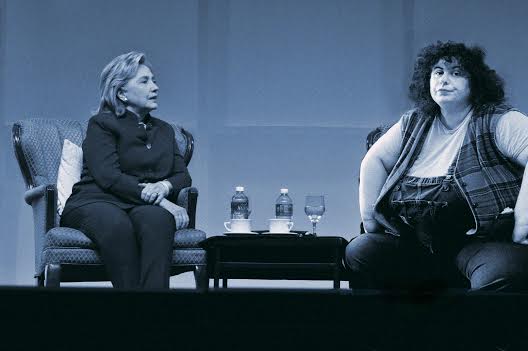Big Mother Is Watching You: The Swedish Model Goes Stateside
In the fifth installment of her column, Big Mother Is Watching You, a guide to prominent anti-sex worker activists and officials, Robin D. outlines the major figures promoting the End Demand/Swedish Model phenomenon in the United States.
When the Sex Purchase Ban passed in Sweden in 1999, prostitution was legal there. Proponents of the Swedish Model in the U.S. talk about “decriminalizing the women,” but implementing this model has never involved the removal of criminal laws against anyone. It’s mostly all talk. Several U.S. jurisdictions (Illinois, Colorado, Atlanta, Boston, Chicago/Cook County) have had laws branded “End Demand” pass. In none of these cases was any effort made to remove criminal penalties for sex workers.
Here are some of the key players involved in bringing the Swedish model to the United States:
Rachel Durchslag, Chicago Alliance Against Sexual Exploitation, Hunt Alternatives Report Fund Author

“I saw a film about human trafficking, and I was haunted. Then I found Chicago was a major hub for human trafficking. Once I realized my own city was not stepping up, I felt called to do something,” says Rachel Durchslag, Chicago Alliance Against Sexual Exploitation (C.A.A.S.E.) founder and Sara Lee heiress. But this tourist in human suffering couldn’t take it for long, and she didn’t have to. In 2013, she left her human trafficking work to practice Reiki.
Since her youth, Durchslag grappled with poor-little-rich-girl syndrome in isolation until, at a retreat for “young funders” (read: people with inherited wealth), she found peer support. “After I said my great-grandfather started Sara Lee, I felt this lightness that I don’t think I’ve really ever felt before then. That was the first time I had ever publicly said that, and all of a sudden it clicked, I didn’t do anything wrong to be born into this family, there’s nothing productive about me feeling continually guilty about being born into this family, but there is a lot that I can do,” she explained to 136 Radio. What she did was use her trust fund to start the Chicago Alliance Against Sexual Exploitation, a key player in the passage of an End Demand ordinance in Cook County in 2008. They have since done some good work in making progressive criminal justice reforms including the repeal of felony prostitution in Illinois, but they are unwavering in their continued support for the criminalization of sex work clients.
Durchslag has written for the Huffington Post about reading client forums. Like the Invisible Men Project does, Durchslag appropriates the suffering of victims of violence to justify policies that clearly make sex workers’ problems worse. She does so in a very prurient manner, both in the article above discussing a 2013 C.A.A.S.E. report she co-wrote on client forums and in the report itself, in which she stoops to quoting rape perpetrators describing their crimes on review boards, without regard for the wishes of the subjects of those reviews. This disturbing voyeurism is interspersed with discussions of relatively neutral topics, such as determining what’s on offer at spas advertising erotic massage. If workers weren’t getting arrested, go figure, maybe they could tell Durschlag what services they provide directly.
Durchslag also seemed to love to give other people like her access to her tourism of the sex industry. She invited colleagues and friends to participate in the publicity around a “human trafficking play” with the dehumanizing title Roadkill.



 Why is pornography legal in the United States, if it is illegal to have sex for money? Why is selling sex so that only your client witnesses it illegal, but when you ensure that the entire world could potentially view you on film, this act legitimizes the prostitution? If pornography never affects real life, then why do pro-porn advocates cite empirical evidence for its impact on reducing rates of male sexual assault of women?
Why is pornography legal in the United States, if it is illegal to have sex for money? Why is selling sex so that only your client witnesses it illegal, but when you ensure that the entire world could potentially view you on film, this act legitimizes the prostitution? If pornography never affects real life, then why do pro-porn advocates cite empirical evidence for its impact on reducing rates of male sexual assault of women?